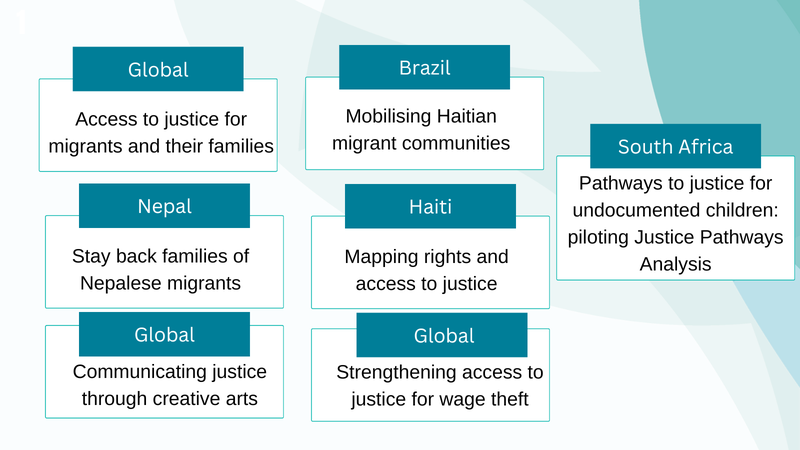Goal 16.3 of the Sustainable Development Goals (SDGs) aims to “promote the rule of law at the national and international levels and ensure equal access to justice for all” by 2020. Yet accessing justice remains challenging, if not elusive for a significant proportion of the world’s population. Access to justice is even more challenging for people who move from one country to another.
The lack of rights-based systems of migration governance – or the inability to access such systems where they exist - is creating a human rights crisis for migrants at borders, in countries of origin, and destination, and the countries through which they move. This, in turn, undermines the potential for migration to contribute to development.
Building on the findings of our research, this theme explores the ways in which access to justice can reduce migration-related inequalities.
Our research examines:
- The experiences of different migrant groups in accessing remedies to secure improved outcomes (e.g., refugee protection, citizenship and nationality, employment rights);
- The existence of current laws and policies relating to migrants and their families and the extent to which these deliver meaningful access to rights for those who move within the corridors.
- The relationship between rights and inequality outcomes, identifying and testing interventions which contribute to the delivery of the SDGs.
Our approach to access to justice
We adopt a bottom-up approach in our research, approaching issues of justice and access from migrants’ lived experiences to guide our suggestions on further research and policy or strategic interventions. Going beyond or against the Eurocentric and state-centric notion of access to justice, we take a broad view of justice mechanisms, to include the informal, traditional, and non-state that are more relevant to some of the communities that we are working with. We consider the broader dimensions of social justice, therefore looking into non-judicial administrative structures and their practices regarding the inclusion or exclusion of migrants in delivering the various services that they need and/or are entitled to. Finally, in our approach we emphasise the importance of breaching the citizen-migrant divide regarding intersecting injustices to build solidarity among and within communities in which migrants live.
Learn more about our approach in the UNU-CPR discussion paper: Shrinking the justice gap: Rethinking access to justice for migrants in the Global South.
Research context
Migration is a positive and empowering experience for some, but for others the lack of rights-based systems of migration governance at the global, regional, and national levels has created a human rights crisis for migrants at borders and in countries of destination, in turn undermining the potential for migration to contribute to development and the delivery of the SDGs. All human rights under international law, except for some political rights, apply to migrants, regardless of their nationality or reasons for moving. However, migrants’ access to fundamental civil, economic and social rights are significantly restricted, and sometimes entirely denied, in some of the MIDEQ case study countries. Additionally, there is a lack of safe, regular, affordable, and accessible routes for many migrants pushing them into irregular migration, and in the hands of human smugglers and traffickers. This further greatly impacts on those fleeing persecution and human rights abuse, in countries that are both signatories and non-signatories of the 1951 Convention relating to the Status of Refugees. Despite the violations that they may experience, many migrants, most notably those in irregular situations, lack opportunities to access justice and the rights to which they are entitled. This is due, in part, to the fact that they tend to live and work in the shadows, they often lack knowledge about their rights or how to enforce them, and are disproportionately vulnerable to discrimination, exploitation and marginalization.
Migrant and refugee rights have come to be seen as a problem by some States and are increasingly presented as a zero-sum game. In other words, as though there is a limited quantity of opportunities associated with the provision of rights (particularly socio-economic rights) such that giving rights to one group takes away and/or undermines the rights and opportunities available to another. In this way different groups are set against each another, most notably nationals and non-nationals. Rights for refugees and other migrants have also come to be seen as a threat to border control particularly in contexts where issues of national security have been emphasised in domestic political narratives, even though there is no statistical correlation between increased migration and refugee movements on the one hand, and increased criminality or national security threats on the other.
In this context, the research undertaken as part of MIDEQ’s Access to Justice work aims to better understand both the availability of, and access in practice to, rights for migrants in MIDEQ countries, situating these opportunities within broader political discourses of migration and citizenship.
Research questions
- What formal and informal mechanisms exist for migrants to access justice/rights in MIDEQ destination countries? In what ways do these mechanisms reflect broader political and policy approaches to rights for citizens/non-citizens and national/regional migration narratives? Are migrants able to access these mechanisms in practice? How effective are they?
- What role is or could be played by governments in countries of origin in ensuring that migrants are protected from exploitation or abuse e.g. pre-departure information, consular support?
- What role is or could be played by non-governmental and civil society organisations in supporting migrants to secure access to justice in destination countries? How can international organisations best support this work?
- What are the opportunities and constraints for developing networks of community paralegals to work with migrants in securing access to justice in MIDEQ destination countries? Where legal empowerment programmes are developed, how effective are they?
- How can other ‘actors’ including the private sector and recruitment agencies be supported or encouraged to centre migrant rights and access to justice in their work?
Access to justice interventions
Working with researchers from across the Hub, our international project partners, particularly the International Labour Organisation and the Office of the High Commissioner for Human Rights, the Migrant Justice Institute and local non-governmental and civil society organisations, we will identify and deliver interventions which support access to justice for migrants and their families, assessing their effectiveness and producing a series of best practice and advocacy toolkits for use in supporting migrants to access justice within and beyond the MIDEQ case study countries. Our work across the MIDEQ Hub includes various interventions with the MIDEQ teams in Brazil, South Africa, Nepal, Haiti, and the theme on arts, creative resistance, and well-being.
Learn more about MIDEQ's access to justice interventions.

The Access to Justice work is undertaken by the United Nations University Centre for Policy Research and Coventry University.


